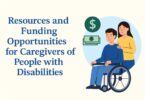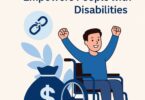Advertisements
Living with a disability often brings unique challenges, but it should never mean being left without support. Across the United States, federal and state programs, nonprofit organizations, and community initiatives provide financial assistance to help people with disabilities live more independently.
In 2025, many grant programs have been updated to make it easier to apply and receive support. Whether you are living with a disability or supporting a loved one, this guide explains the top financial support options available, how to apply, and where to find trusted resources.
Understanding Disability Grants
Disability grants are financial awards that do not need to be repaid. They are intended to cover specific needs such as healthcare, housing, education, or job training.
Advertisements
Unlike loans, grants do not create debt, and unlike ongoing benefit payments such as Social Security Disability Insurance (SSDI), they are usually one-time or project-based awards. Eligibility varies depending on the program, but the goal is always to reduce barriers and improve quality of life.
Federal Disability Support Programs in 2025
Social Security Administration (SSA)
-
Supplemental Security Income (SSI): Provides monthly financial support to individuals with limited income who are disabled, blind, or over 65.
-
Social Security Disability Insurance (SSDI): Offers monthly payments to individuals who are unable to work due to a disability and have a qualifying work history.
U.S. Department of Housing and Urban Development (HUD)
-
Section 811 Supportive Housing for Persons with Disabilities: Helps people with disabilities live independently by providing rental assistance and supportive services.
-
Housing Choice Voucher Program (Section 8): Offers rental subsidies to low-income families, including those with disabilities.
U.S. Department of Education
-
Federal Student Aid for Students with Disabilities: Provides grants, scholarships, and loan forgiveness programs for students with documented disabilities.
-
Vocational Rehabilitation Programs: Funded by both federal and state governments to help individuals with disabilities prepare for, find, and maintain employment.
U.S. Department of Veterans Affairs (VA)
-
Specially Adapted Housing (SAH) Grants: Helps veterans with service-connected disabilities purchase or modify homes for accessibility.
-
Automobile and Special Adaptive Equipment Grants: Provides financial assistance for vehicles and adaptive equipment for veterans with certain disabilities.
State and Local Disability Grants
Every state offers its own set of disability resources in addition to federal programs. These often include:
Advertisements
-
State vocational rehabilitation services that provide job training and employment support.
-
Home modification grants for accessibility improvements.
-
Transportation assistance programs for accessible public transit or specialized vehicles.
To find programs specific to your state, visit your state’s Department of Health and Human Services or Department of Disability Services.
Nonprofit and Community-Based Resources
Nonprofit organizations fill important gaps in disability support. Many provide grants for equipment, therapy, or emergency expenses. Examples include:
-
The Arc of the United States: Offers support and advocacy for individuals with intellectual and developmental disabilities, including access to funding resources.
-
Easterseals: Provides financial assistance for rehabilitation, therapy, and assistive technology.
-
National Disability Institute: Offers financial empowerment programs and helps individuals with disabilities access funding opportunities.
-
United Spinal Association: Provides small grants for mobility equipment and independent living support.
Local community foundations also provide micro-grants or emergency aid, which can often be easier and faster to access than federal programs.
Grants for Caregivers and Families
Caregivers play a vital role, and many programs provide support directly to them. Examples include:
-
Lifespan Respite Care Program: Provides funds to help caregivers of people with disabilities take much-needed breaks.
-
Family Support Programs: State-based initiatives that may cover transportation, respite services, and home adaptations.
-
Medicaid Home and Community-Based Services (HCBS) Waivers: Allow families to receive funding for in-home care and community support instead of institutional care.
Education and Employment Grants
Access to education and employment creates long-term independence. Programs in 2025 include:
-
Federal Pell Grants: Available to low-income students, including those with disabilities, to help cover college costs.
-
Workforce Innovation and Opportunity Act (WIOA): Funds training and employment programs for individuals with disabilities.
-
Job Accommodation Network (JAN): Provides free guidance on workplace accommodations and funding opportunities for adaptive equipment.
-
Nonprofit scholarships: Many private foundations offer scholarships specifically for students with disabilities, such as the Google Lime Scholarship or Microsoft Disability Scholarship.
How to Apply for Disability Grants in 2025
Applying for grants can feel overwhelming, but following a step-by-step process makes it manageable:
-
Research programs: Use official websites such as Benefits.gov, Disability.gov, and SSA.gov.
-
Check eligibility requirements: Review income limits, disability definitions, and residency requirements.
-
Prepare documents: Medical records, proof of income, identification, and disability certifications are usually required.
-
Apply online: Most federal and state programs now have secure online application systems.
-
Follow up: Track your applications and submit additional documents promptly when requested.
Tip: Never pay anyone to apply for a government grant. Legitimate programs do not require application fees.
Inspiring Success Stories
A single mother in Texas was able to install a wheelchair ramp in her home thanks to a state housing modification grant. A veteran in Florida used a VA Specially Adapted Housing Grant to make his home fully accessible, giving him greater independence. These stories highlight the impact that financial support can have on everyday life, promoting dignity and empowerment.
Practical Tips for Maximizing Support
-
Apply for multiple programs when eligible since many can be combined.
-
Keep documents organized in a dedicated folder to make repeat applications faster.
-
Sign up for newsletters from advocacy organizations like the National Council on Independent Living.
-
Connect with local disability service offices for community-based resources.
Conclusion
Disability should never mean disadvantage. With the wide range of federal, state, and nonprofit programs available in the United States, individuals and families can find meaningful financial support in 2025. These grants and resources open the door to greater independence, education, and opportunity.
If you or someone you love could benefit, start your application today and share this information with others who may need it.
👉 Apply now to explore the disability grants and financial support available in your area.
Advertisements


Leave a Comment